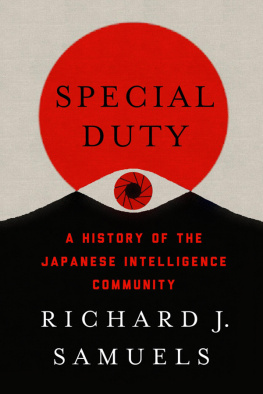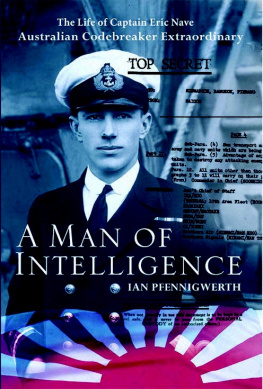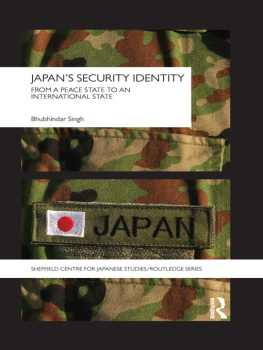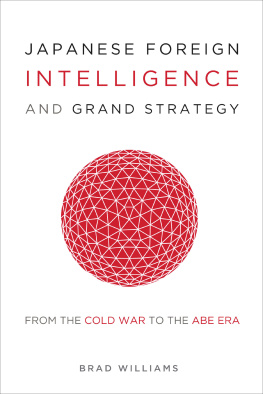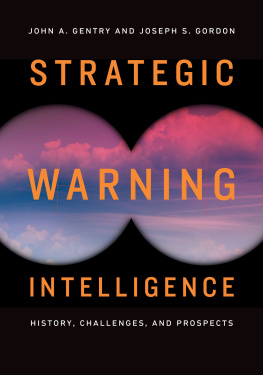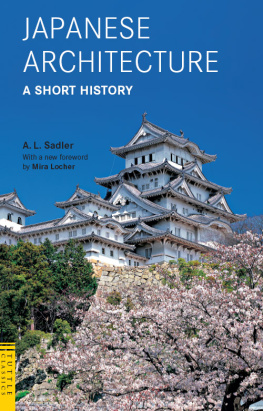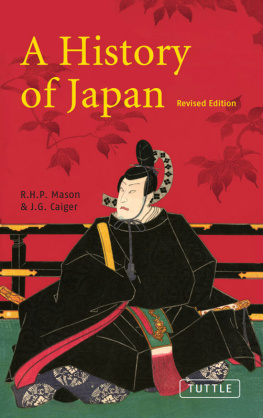
In memory of Chalmers Johnson, the bold and brilliant Asia scholar, and of Wakamiya Yoshibumi, the generous and open-minded journalist for whom the adjective intrepid is entirely inadequate.
Speaking of the recently deceased U.S. covert operative Alden Pyle, a colleague noted in a low voice tense with ambiguity: He had special duties He was a very quiet American.
Graham Greene, The Quiet American
Preface
One often hears Japanese refer to their country as a unique small island trading nation, precariously dependent on imported raw materials and adrift in a hostile world. Apart from the fact that all nations claim to be unique, that Japan is not small economically or demographically, and that its dependence on imports is no greater than that of many other countries, there is some truth in this mantra. Japans neighborhood, and the world in which its businesses and citizens operate, have always been filled with threats. This has never been truer than it is today, when shifts in Tokyos relations with its colossal Chinese and nuclear-armed North Korean neighbors portend modification of relations with its powerful U.S. ally. Japans intelligence officers have to judge the speed, trajectory, and certainty of transformations in the balance of power, and policy makers need to decide what measures to take to protect those businesses and citizens. In the decades of study of Japans evolving security community, virtually no sustained attention has been paid to its once expansiveand then atrophiedintelligence community. This community is atrophied no longer; a close look at its past, present, and future is overdue.
Japan was in ruins and its intelligence community was at its feeblest at the end of the Asia-Pacific War, a time of momentous institutional enhancement of the U.S. intelligence community. In January 1946, when the triumphant President Harry S. Truman created a National Intelligence Authority and the post of director of central intelligence to coordinate government-wide intelligence activities, he seized the chance to have some fun. The president gave his senior deputies black cloaks, mustaches, and wooden daggers. The fortified U.S. intelligence apparatusand those of its allieswere not always playgrounds for practitioners, but thanks more to novelists, screenwriters, cartoonists, and comedians than to scholars, licensed skullduggeryand the secret agents who practice itbecame Cold War stereotypes and satirical fodder. Who did not appreciate James Bond, George Smiley, or Jason Bourne? And who was not amused by Boris Badenov, Natasha Fatale, Maxwell Smart, or Austin Powers?
And as recently as the eve of Americas entry into World War II, President Franklin D. Roosevelt was dispatching personal friends to gather information on war-torn Europe.
By thenactually by the end of World War Iintelligence had already become as much a matter for professional bureaucrats as for spies and their derring-do. Indeed, our embrace of the exploits of secret agents belies both how difficult the intelligence business is and the deadly serious role it plays in national security affairs. Members of an intelligence communityshorthand for the network of collectors of adversaries secrets and analysts of threatare in the business of helping decision makers manage uncertainty. They must separate potential and distant challenges from real and near ones in an environment in which their enemies intentions are often the most closely guarded of all secrets. They must separate what matters from what only seems to matter, to distinguish what is known from what is unknown, and to know what they do not know. Once we acknowledge that all this takes place in the context of existential threat, intelligence ceases to appear all fun and games, and getting its organization right becomes imperative.
Our perceptions of the intelligence community have been shaped predominantly by American, British, Soviet, and Israeli espionageby Ludlums CIA, le Carrs MI6, The Americans KGB, or Reicher Atirs Mossadand The popular allure of ninjas notwithstanding, clearly there is some confusion abroad regarding whether the Japanese are or are not inherently adept at espionage. As we shall see, there was no inherent intelligence deficit preventing the Japanese intelligence community from expanding or from having its share of success during the first half of the twentieth century.
Meanwhile, the joke at home in Japan has been about the bureaucracies, not the secret agents. In the standard Japanese narrative, during the Cold War Japan had no CIA but did have a KGB: Keisatsu (National Police Agency), Gaimush (Foreign Ministry), and Beich (Defense Agency). This speaks to a fundamental truth that will inform much of the analysis in this book: these separate government agencieslike those elsewhere within Japan and in intelligence communities abroadseem to have forever been engaged in intense (sometimes petty) jurisdictional competition, captive in silos inhibiting coordination. The Japanese intelligence community, like the U.S. and British ones, took a sharp bureaucratic turnperhaps even earlier and more sharply than in Washington or London. In the Japanese narrative, more of the countrys heroesmany of whose photos are in this volumewere celebrated as military and government officials than as gallant national champions. They were patriots, of course, but in the first instance they were cashiered soldiers in the former Imperial Japanese Army who were joined by diplomats in the Ministry of Foreign Affairs (MOFA), crime fighters in the National Police Agency (NPA), economists in the Ministry of International
So this term will be used with caution in these pages. And indeed, we can recognize that not all the problems encountered (or created) by the Japanese intelligence bureaucracies should be connected to the domestic structure of strategic policy making. Subordination to Washington also muted interest in developing Japans postwar intelligence community. During the Occupationand even well after Japan regained sovereigntyits intelligence function was derivative, underdeveloped, and narrowly aimed at domestic enemies and foreign firms. The larger strategic horizon was monitored by its ally the United States. Resentment of Japans subservience to its U.S. partnerwhat one intelligence journalist has called a persistent master-servant relationship ( shuj kankei )never independently forced the shape and pace of Japanese intelligence reform, but it did become a more persistent problem than is normally acknowledged. Most Cold War Japanese intelligence and security professionals accepted that they had little choice but to accommodate to U.S. power. As a resultand notwithstanding that there remain gaps in sharing and trustthere has been increasing integration of the two intelligence communities.
While accommodation to the preferences and practices of the U.S. intelligence community was a defining feature of the first decades after the war, the Japanese intelligence communitylike the military overallwas also stifled by clear and insistent public opposition to any practice redolent of wartime governance. Above all this meant that engaging in (or even debating the merits of) intelligenceespecially counterintelligence, but also counterterrorismwas problematic. Every plan, each discussion of the topic, raised hackles among those who feared (not without cause) that the Japanese could slide down a slippery slope back to unrestrained practices like domestic surveillance and foreign aggression that destroyed millions of lives and their nation.
After the Cold War, thoughtful Japanese national security strategistsin both the bureaucracy and the political classtook up intelligence reform with new energy. They began to tinker, reconceive, and, finally, to restructure Japans national security apparatusand with it Japans intelligence community. These, then, are the transitions that are identified and followed in this volume: the expanding, accommodating, tinkering, reimagining, and reengineering of the intelligence community of one of the worlds great powers. It will be a story that shifts from a focus on individuals and their exploits to organizations and their competitions. We will discover how Japan was propelled on this century-long course, why reform was so constant and difficult, and what consequences this had for Japans national security.
Next page
